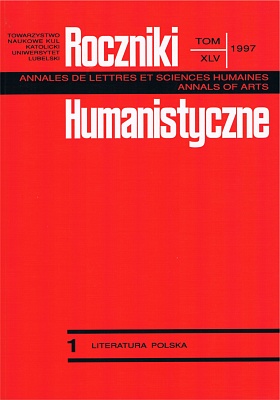The Presence of Psalms in Polish Contemporary Poetry
Abstract
What is psalm in contemporary lyrical literature, a genre of poetic speech or form of religious behavior? Psalm cannot be reduced to choice determinants extant in the linguistic-literary sphere. Irreducible elements, that one may observe in any translation, are inherent in the deep structure: these are particular relations between God (always present in the psalm) and man. Contemporary psalm lyrics draw on to anthropological and theological reality of the genre. The paper discusses three different manner of communing with psalms in poetry: 1. references and comments on the original psalms (e.g. Anna Kamieńska, Ludwik Hieronim Morstin, Marian Piechal, and Rev. Kazimierz Wójtowicz); 2. continuations (e.g. Roman Bradstaetter's psalms, Aleksander Wat's triptych); 3. lyrics within the framework of the psalm, e.g. Joanna Kulmowa, Eda Ostrowska or Tadeusz Nowak, and Wisława Szymborska. In the awareness of the writers there exists a belief that the psalm is exceptional, for it "expresses sacred and mythological unity of the world" (Stanisław Balbus). Poets refer to this genre in difficult moments (war, death, old age, and life threat), or in order to express important issues (e.g. an apprehension of ecological extermination, political and national divisions). It happens so that psalms are used for nonreligious purposes, sometimes just blasphemous, but the tone of loftiness written in psalms prevails, and there is something sacred in this literary phenomenon.
Copyright (c) 1997 Roczniki Humanistyczne

This work is licensed under a Creative Commons Attribution-NonCommercial-NoDerivatives 4.0 International License.





